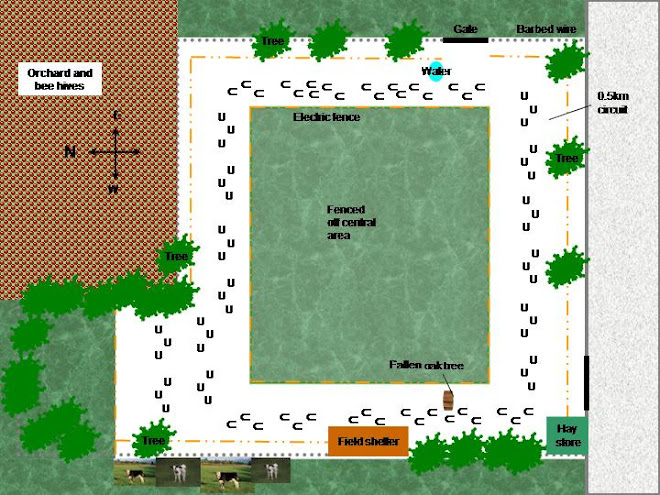Sorry guys but I promised a client I would post tonight about farts (and how to reduce them - in horses that is.)
One of the coincidental (or not) things I have noticed is that a horse with LGL or worse is usually a bit gassy (or may have been gassy in the immediate past). A horse with a happy tummy tends to have less gas - so fewer farts and just maybe, less incidence of LGL.
This is not a precise or even any kind of science. Just one of the things to watch out for when managing your horse for optimum health. Certainly since Grace has been on her mega low sugar and very high fibre diet she doesn't fart at all. Whereas client horses with high starch diets have a habit of dropping wet ones at the most inopportune moments, certainly I regularly sport a unique and unsaleable brand of hair gel. Maybe it is their way of getting their own back for me messing with their toes.
Anyway, enough of the locker room humour and onto the techy stuff.
Techy stuff
The equine Cecum is pretty big; 28-36 litres (7.4 - 9.5 US gallons) (6.2 - 7.9 UK gallons) and it is home to billions of microbes.
These microbes are reliant on their horse for protection as well as for nutrition. The horse’s diet provides the microbes in the cecum with an energy resource unusable by the horse. In turn, the end products of the microbes’ metabolism provide the horse with an energy resource.
Horses rely on the microbes in the cecum, to aid in digestion and to make nutrients available that would otherwise be unavailable through enzymatic digestion alone.
It has been observed that disruptions to the delicate balance of cecal microflora can have systemic effects on horses, including changes in fecal and blood pH levels, diarrhea, weight loss and lameness due to laminitis.
One common source of microbial imbalance occurs when a horse ingests a large amount of cereal grains or grass that is too rich in carbohydrates or starch. Such a carbohydrate overload is common in pasture-fed horses during the spring and summer when grass grows very rapidly. It is also common when horses are fed large amounts of cereal grains.
When the cecum is overloaded with sugars/starches certain bacteria such as Lactobacillus and Streptococcus bovis over grow, resulting in an increase in lactic acid production and an overall change in bacterial populations as pH levels decrease. (Rowe)
The exact mechanism of laminitis is still not fully understood. Fortunately for us, we don't really need to know, we just need to keep the microbes happy so the that unhappy chain of events that lead to founder never get started. (Also read this blog entry.)
So - keep the farts to the minimum, feed your horse the diet he was designed for. Low sugar/starch and high in fibre please :-)
Important note
If your horse is lacking in energy - before you whack extra carbs into his diet, consider reducing them instead. Sugar overload is exhausting. The bacteria in the cecum are disturbed, digestion goes haywire and the horse actually gets deprived of nutrients rather than getting extra. You may find your horse sleeping more, or standing around with head hanging; maybe with a slightly hungover expression. If you get any of these, cut the sugar as a first option, give it a few days and then reevaluate.
If your horse is losing weight then add safe energy - always fibre first. If they can't chew another blade then add a low sugar/starch food source such as linseed (flax seed in the US).
Fibre digestion keeps a horse warm too, so you won't need as many (or maybe any) rugs.
Shoes mask weaknesses, barefoot highlights strengths
Sunday, 31 October 2010
Subscribe to:
Post Comments (Atom)








6 comments:
Two years ago, I would never have thought that I would be interested in farting, but here I am reading your blog! Unique hair gel?? Oh, dear. :-) Interesting post and a good sanity check.
Very interesting blog, I wonder who has the farty horse??
I wish everything I read on LGL and related issues was so easy to understand.
Thanks for blogging on request!
Happy to oblige. Anything else you want covered just let me know - if I can I will blog about it. Lots of farty horses at the moment. Really warm weather for November is not helping. Am I the only person praying for it to get colder?
I have a very farty horse...she farts especially when trotting uphills. But we don't have much grass in the pastures. She is fed high quality 2nd or 3rd cut hay and a scoop grain 2x a day. Plus she also gets soy in her grain and a glucosamine supplement. Could the grain be the sugar culprit? (Although she is full of gass, she has never had a hoof/lame problem, and she is also barefoot...knock on wood)
Hiya Anon
Grain is quite a broad term. But 'grain' usually has a lot of starch.
A gassy horse doesn't mean a lame or lami horse. But a lami/LGL horse has an upset gut and is often gassy if that makes any sense?
Feeding to reduce the possibility of gastric upset (and the knock on LGL/lami) has an upside in that it can reduce gas. Bonus! :-)
I really enjoyed this blog post as I have often wondered about the farting. Thanks for sharing!
~Gina Chianello
Parelli Central
Post a Comment